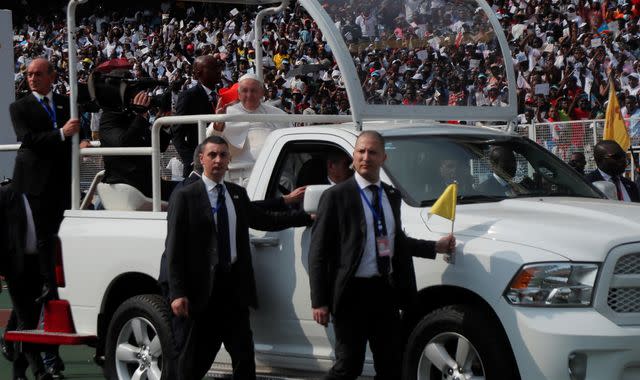'Your pain is my pain': Pope urges young people to forge a new future as he meets victims of atrocities in Congo

Pope Francis has urged young people in the Democratic Republic of Congo to forge a new future without the ethnic rivalry, corruption and distrust that have fuelled so many bloody conflicts in Africa.
The pontiff made the remarks as he addressed more than 65,000 young people in Martyrs stadium in the capital Kinshasa.
Pope Francis spoke of forgiveness and reconciliation, themes that have dominated his visit to Congo, where armed conflict has killed and displaced millions of people over the past decades.
His speech today focused on what he called "ingredients for the future" and struck a more hopeful tone than his previous ones as he spoke of potential new horizons for Congo rather than of its bloody past and present.
The speech was interrupted so often by applause and cheers that at one point an organiser took a microphone and shouted "let the Pope speak" before he could continue.
He told the crowd: "Beware of the temptation to point a finger at someone, to exclude another person because he or she is different; beware of regionalism, tribalism, or anything that makes you feel secure in your own group."
He continued: "You know what happens: first, you believe in prejudices about others, then you justify hatred, then violence, and in the end, you find yourself in the middle of a war."
Congo has some of the world's richest mineral deposits, but its abundant resources have stoked conflict between ethnic groups, militias, government troops and foreign invaders.
Eastern Congo has also been plagued by violence connected to the long and complex fallout from the 1994 genocide in neighbouring Rwanda.
"To create a new future we need to give and receive forgiveness. That is what Christians do," he said.
In urging the young people in the packed stadium to "do the right thing", Francis also asked them not to repeat the mistakes of previous generations. He singled out "corruption, which never seems to stop spreading".
He led the stadium in an impromptu chant of "no to corruption" in French, Congo's common language.
The theme struck a chord with many young people in the stadium, who denounced their own leaders as corrupt and complained of routinely having to pay bribes to receive what should be ordinary services.
The United Nations says African economies lose nearly $150bn (£122bn) to corruption each year.
Earlier in the day, the Pope heard first-hand of the atrocities some of the people in Congo have endured, including a teenage girl who was "raped like an animal" for months, a young man who watched as his father was decapitated, and a former sex slave who was forced into cannibalism.
The 86-year-old pope, who arrived in Congo on Tuesday, flies to neighbouring South Sudan on Friday.
Read more on Sky News:
Pompeo reveals who he thinks is more dangerous than Putin
How South Africa's scheduled power cuts put lives on the line
He will be visiting jointly with the Archbishop of Canterbury and the Church of Scotland Moderator, in what the three Christian leaders have described as an unprecedented "pilgrimage of peace".
South Sudan, the world's youngest country, is also grappling with conflict and hunger following a civil war that was fought
mostly on ethnic lines and killed 400,000 people.
Congolese from the country's violence-wracked east travelled to the capital of Kinshasa to tell the Pope of the horrific violence they suffered for years as rebel groups sought to gain territory in the region through attacks that have forced more than five million people to flee their homes.
Francis sat in silence at the Vatican Embassy in Kinshasa as victim after victim came forward to tell their stories.
He watched as they offered up at the foot of a crucifix a symbol of their pain: the machete used to maim and kill, or the straw bed mat on which they had been raped. When they knelt in front of him for a blessing, Francis placed his hand on their heads, or on the stumps of the arms that remained.
"Your tears are my tears; your pain is my pain," Francis told them. "To every family that grieves or is displaced by the burning of villages and other war crimes, to the survivors of sexual violence and to every injured child and adult, I say: I am with you; I want to bring you God's caress."

 Yahoo News
Yahoo News 
